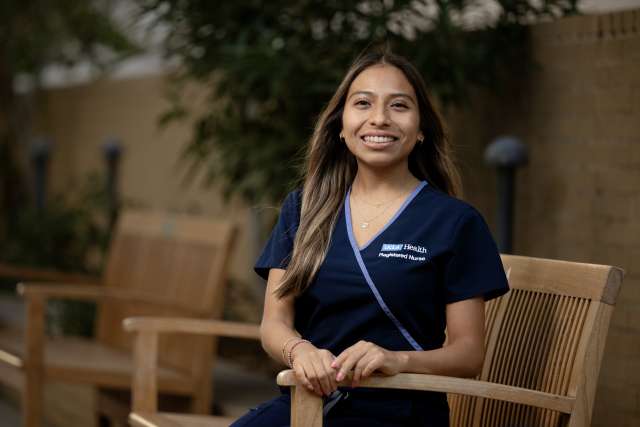When Iris Mayoral, BSN RN-BC, steps on the floor of her unit each day, improving the lives of her patients and colleagues is foremost on her mind. It’s that laser focus, coupled with a relentless drive to enhance her knowledge and skills, that has earned her accolades both inside and outside of UCLA Health.
Mayoral is a clinical nurse on 4 North, the geriatric medical/psychiatric unit at the Stewart and Lynda Resnick Neuropsychiatric Hospital (RNPH) at UCLA. She began her career there seven years ago through the health system’s new graduate residency program.
Given her drive to put patients at the center of care, it’s been a perfect fit.
“I absolutely love the patient population we care for, and I have felt it’s been the perfect environment to make changes that improve the patient experience and outcomes,” Mayoral says. “A lot of resources within UCLA have made those things easier to implement.”
Crisis drives decision
Mayoral grew up in the San Fernando Valley knowing she wanted a career in the health field. She attended a medical magnet high school in Van Nuys, where she was exposed to a variety of roles in a hospital setting. During the required 300 volunteer hours, Mayoral fell in love with nursing. A summer youth internship in the Emergency Department and GI lab at Kaiser Permanente during her junior year solidified her choice.
“I got a sense that the nurses had more of a patient-centered role, and that spoke to me,” she explains.
What led to her interest in psychiatric nursing specifically was deeply personal – a loved one became ill with an acute psychiatric condition and was treated at RNPH for an extended period.
“I remember that being a really scary time for my family and me, and for our family member going through it,” she recalls. “I also remember the sense of hope and reassurance I felt from the nursing staff. They were there to answer our questions about what was going on, and they were able to advocate for things we felt were important to us. Most importantly, they were able to establish trust with our loved one going through that experience, and that was huge.
“After that, I thought I would like to help others going through that in the future.”
Improving outcomes
Mayoral continually identifies areas for improvement. One of her most meaningful projects, she says, has been a proactive toileting program on 4N.
Her unit had a high rate of falls, and Mayoral wanted to understand the root cause. She looked at the behaviors patients were showing at specific times of day and was able to correlate them with the times they were falling.
“Based on that observation and the literature, I saw that a way to decrease falls is to toilet the patients every three hours and, specifically, an hour after meals and right before the change of shift.”
As a result, the unit accumulated 96 days without a patient fall – “which is huge in a psychiatric geriatric unit,” she notes.
Her current project is a “Getting-to-Know-Me Sheet” – a patient-specific hand-off sheet that improves communication between staff during shift changes. The sheet includes the patient’s fears and triggers, preferred pronouns and language, ambulation status, toileting information and emergency contacts.
Initially, the hand-off sheet was handwritten; but using her knowledge of informatics, Mayoral was able to integrate the information with the patient’s electronic chart in a format that can be printed and handed to the incoming shift.
“The information helps with calming strategies, it helps prevent escalations and it also helps with patient mobility,” she says.
Always innovating
Mayoral has been involved in leadership beyond her unit, as well. She served as chair of the RNPH New Knowledge, Innovation and Improvements Council and as the chair of the UCLA Health System Research & Innovation Council. On that systemwide group, Mayoral helped plan the annual Evidence-Based Practice Conference.
Mayoral’s contributions are being noticed outside of UCLA Health, too. Earlier this year, she was one of 30 nurses – 10 from UCLA Heath -- to be honored by the Simms/Mann Family Foundation’s Off the Chart program, which recognizes nurses for outstanding care.
By the program’s design, recipients embody “a bias toward action, capacity for self-direction, originality and creative instincts, courageous and bold thinking, and the potential to achieve even more.”
The honor came as a surprise to Mayoral, as did the $10,000 award.
“It was really validating to see my work recognized,” she says, adding she hopes the Off the Chart program will shine a light on the contributions nurses make every day. “The health of everyone relies on nurses, so I think this helps push that conversation forward.”
Spirit of hopefulness
Mayoral earned her Bachelor of Science in nursing from the University of Pennsylvania, where she minored in music – something that’s been important to her throughout her life, she says.
She notes that nursing and music have a commonality.
“Working with teams in psychiatric nursing, you have to do a lot of listening to capture what a patient is feeling, experiencing, and going off those cues,” Mayoral says. “It’s similar to how you work when playing with other musicians.”
In 2021, she completed the UCLA Nursing Informatics Fellowship and is currently enrolled in a graduate psychiatric nursing program at Duke University on the way to her doctoral degree in nursing.
For Mayoral, learning new ways to improve patient outcomes never ends.
“I think my passion stems from a sense of responsibility and a feeling that it’s a privilege to care for these individuals in moments in their lives when they are vulnerable,” she explains. “Having had a family member in the in-patient psychiatric unit, I take making sure they’re getting the highest quality care seriously. When I see areas for opportunity, I ask, ‘What can we do to make this better?’ I have this spirit of hopefulness that there is always a way to improve things using our resources.”



